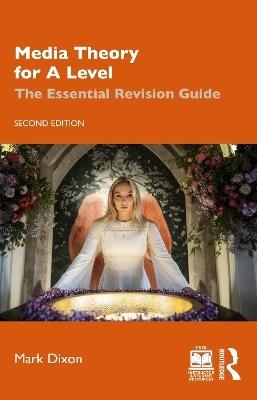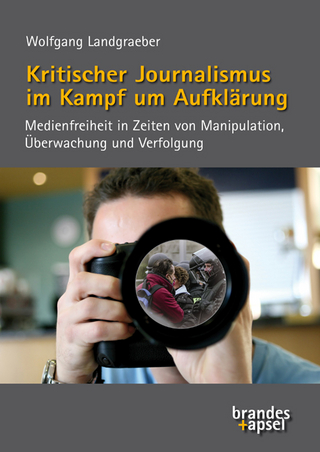
Media Theory for A Level
Routledge (Verlag)
978-1-032-42102-5 (ISBN)
From Roland Barthes to Clay Shirky, from structuralism to civilisationism, this revision book explains all the core academic concepts students need to master to succeed in their exams. Each chapter contains comprehensive explanations of the academic ideas and theories specified for GCE Media study as well as practical tasks, higher level ‘challenge activities’, glossaries, reference tables and revision summaries.
The second edition of this best-selling guide features:
Updated and revised chapters and exemplars, reflecting the new A Level Media specification (AQA, Eduqas, OCR and WJEC).
Overviews of core areas and potential approaches that could be taken in exam responses.
Overviews of secondary theory that can be used in responses.
This book is key reading for teachers and students of A Level Media Studies and is also a useful resource for GCSE students.
Media Theory for A Level is accompanied by the www.essentialmediatheory.com website that contains a wide range of supporting resources including revision flashcards, worksheets and more exemplar applications of theory to current set texts.
Mark Dixon is an Eduqas A Level examiner and Head of Media and Film at Durham Sixth Form Centre. He is also a freelance author, and has written for The Guardian, TES, Media Magazine and Teach Secondary as well as authoring a range of digital resources for Eduqas Media.
Media language
1. Semiotics: Roland Barthes
Concept 1: Denotation and connotation
Concept 2: The media’s ideological effect
2. Structuralism: Claude Lévi-Strauss
Concept 1:Binary oppositions
Concept 2: Binary oppositions and ideological significance
3. Narratology: Tzvetan Todorov
Concept 1: The three-act ideal
Concept 2: The ideological effects of story structure
4. Genre theory: Steve Neale
Concept 1: Repetition and difference
Concept 2: Industry effects on genre-driven content
5. Postmodernism: Jean Baudrillard
Key concept: The real and the hyperreal
Media representation
6. Representation: Stuart Hall
Concept 1: Media representation processes
Concept 2: Stereotypes and power
7. Postcolonial theory: Paul Gilroy
Concept 1: Racial binaries, otherness and civilisationism
Concept 2: The legacy of empire and British identity
8. Feminist theory: Liesbet van Zoonen
Concept 1: The female body as spectacle
Concept 2: Masculinity in the media
9. Intersectionality: bell hooks
Concept 1: Interconnected oppression
Concept 2: hooks’ call to action
10. Gender as performance: Judith Butler
Concept 1: Gendered identities are constructed through repetition and ritual
Concept 2: Gender subversion and gendered hierarchies
11. Media and identity: David Gauntlett
Concept 1: Traditional and post-traditional media consumption
Concept 2: Reflexive identity construction
Media industries
12. Ownership effects: James Curran and Jean Seaton
Concept 1: Media concentration
Concept 2: Effects of concentration on media content
Concept 3: Diverse ownership creates diverse products
13. Regulation: Sonia Livingstone and Peter Lunt
Concept 1: Citizen and consumer models of media regulation
Concept 2: Regulation in the globalised media age
14. The culture industry: David Hesmondhalgh
Concept 1: Maximising profits and minimising risks
Concept 2: The effects of the internet revolution are difficult to diagnose
Media audiences
15. Media modelling effects: Albert Bandura
Concept 1: Violent behaviours are learned through modelling
Concept 2: Audiences copy media modelling
16. Cultivation theory: George Gerbner
Concept 1: Fear cultivation
Concept 2: Media consumption leads audiences to accept mainstream ideologies
17. Reception theory: Stuart Hall
Concept 1: Encoding and decoding
Concept 2: Dominant, negotiated and oppositional decoding
18. Fandom: Henry Jenkins
Concept 1: Fan appropriation
Concept 2: Audience–producer convergence in the digital age
Concept 3: Fans use participatory culture to effect wider social change
19. The end of audience: Clay Shirky
Concept 1: Everybody makes the media
Concept 2: Everyday communities of practice
Bibliography
Index
| Erscheinungsdatum | 23.07.2024 |
|---|---|
| Zusatzinfo | 48 Tables, black and white; 7 Halftones, black and white; 7 Illustrations, black and white |
| Verlagsort | London |
| Sprache | englisch |
| Maße | 129 x 198 mm |
| Gewicht | 544 g |
| Themenwelt | Schulbuch / Wörterbuch |
| Geisteswissenschaften ► Geschichte | |
| Sozialwissenschaften ► Kommunikation / Medien ► Journalistik | |
| Sozialwissenschaften ► Kommunikation / Medien ► Medienwissenschaft | |
| Wirtschaft | |
| ISBN-10 | 1-032-42102-9 / 1032421029 |
| ISBN-13 | 978-1-032-42102-5 / 9781032421025 |
| Zustand | Neuware |
| Informationen gemäß Produktsicherheitsverordnung (GPSR) | |
| Haben Sie eine Frage zum Produkt? |
aus dem Bereich


